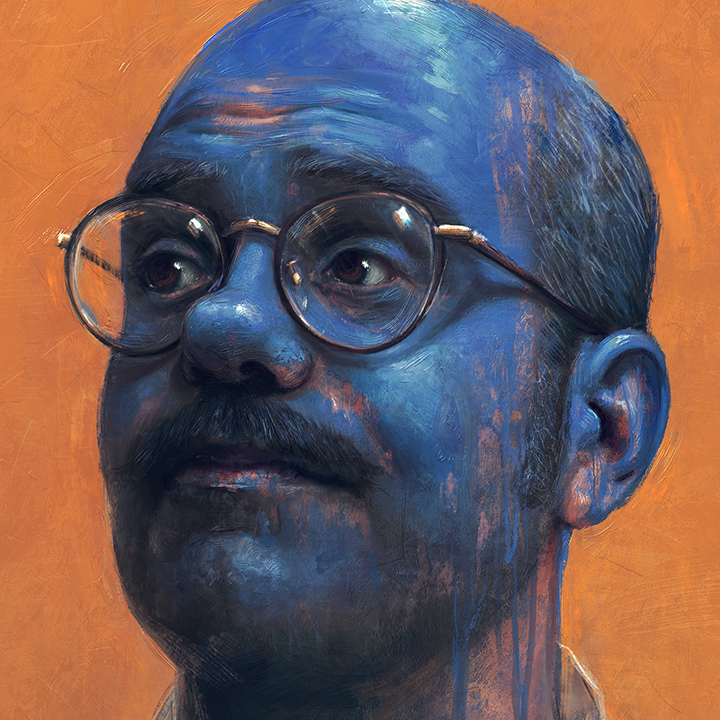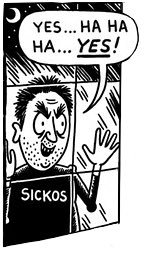Yeah now in the most moronic argument I think I've ever had about this. Apparently this is fine actually and I'm just too paranoid about going outside because temperature gets worse than this.
Trying to explain that it's a combination of humidity + temp and getting extreme snark. Really an example of instead of people able to think for two seconds about the danger of this, people aren't gonna register how bad it is until it happens to them.
I'm also not trying to be a doomer but man I guess God forbid I make people aware of a thing that's happening that could be bad for people. Love when this happens.
That sucks, is it someone you care about, who you are trying to convince to take care of themselves?
Yeah, was just something to talk about while visiting family and assumed it would be a more of a normal conversation that pivoted rapidly to snark and I'm just being a doomer because apparently everyone in that region has dropped dead instantly.
One of those moments of just pure, like what the fuck. But also, maybe should have expected it since it's happens semi regularly.
Yeah I think my entire family except like one Aunt are extremely reactionary in different ways but didn't expect it over temp + humidity.
yeah it's weird that complaining about the weather gets into a debate.
Burgerland seems to have a persistent culture of apathy, where even caring about something, even something that can actually hurt or kill people, is emotional and therefore wrong.

Bad doomerists exist to silence good doomerists by repeatedly megaphoning in their roko's terminator fanfictions.
Bazinga doomers want the fantastical (basically the 1950s and all its values
 but with immortality and infinite holographic waifus), fear the consequences of their own ideology (what if the infinite holographic waifus rebel against them instead of serving them unconditionally), and are bored by actual plausible doom scenarios because they weren't featured in a movie of their preference.
but with immortality and infinite holographic waifus), fear the consequences of their own ideology (what if the infinite holographic waifus rebel against them instead of serving them unconditionally), and are bored by actual plausible doom scenarios because they weren't featured in a movie of their preference.
I definitely understand the concept of a wet bulb event, but what I'm not sure I understand is if we hit these temperatures, why didn't all the unhoused people die? Hearing we hit wet bulb conditions and then not hearing about a mass death wave makes me think wet bulb conditions aren't actually a death sentence
It's not instant death is one reason, you just start to cook/run a fever that your body physically can't cool down from and will only get worse till the temperature drops. If the temperatures were more intense, the effects would be as well. I would say not to take a tweet like this at face value, but it is very serious, and I would expect some amount of deaths to be reported over the next couple days.
Its around 55°C (131°F) that equals a WBT of 34.5°, but it varies with wind and humidity.
It is a matter of time. No one will survive this, unless they can create circumstances in which their surrounding temperatures are better and/or their evaporation is possible. So for example you use the lower temperature at night and close the windows during the day, your house can hold heat and cold, too. If you go outside wear stuff which gives you a shield of cold air etc.
However most people are not permanently out doors, some are though and regularly unhoused people do die during heat waves (as do people that are older, people that have sicknesses or precarious people who are not totally healthy and have shoddy housing).
Sherwood und Huber (2010) schätzten, dass ein gesunder, im Schatten ruhender Mensch Kühlgrenztemperaturen von etwa 35 °C für ungefähr sechs Stunden überleben kann:
Sherwood and Huber (2010) estimated that a healthy passive person in shade can survive WBT of (around OP's value) for roughly six hours.
In Phoenix for example in 2021 around 340 people died due to heat during the heat wave of which a third was unhoused.
Beyond that temperature people can't really sweat/evaporate enough to cool their body down which is basically creating a fever inside of you which makes processes not work that are temperature sensitive and finally you die.
Sorry that I can't be more precise.
A wet-bulb event won't become mass casualty without a collapse of the power grid. People can still escape to cooler areas.
If the power grid collapses simultaneously, there will be nowhere to go.
Submerge yourself in a lake or river would be the only possibilty
Real survival tip folks: if water is even one degree cooler than body temperature, it can still keep you alive in such an event.
People can still escape to cooler areas.
Unless they're physically incapable or prevented from doing so, such as prisoners, rest home residents, or the unhoused in particularly hostile areas.



also while evaporative cooling no longer works, people without A/C might have access to ice? i imagine that helps. also not clear on how immersion in cooler water might help
also not clear on how immersion in cooler water might help
Heat transfer by conduction isn't affected by wet-bulb temperatures. If you jump into a cold lake it will definitely help.
Also, public places like malls and libraries typically have air conditioning. You could go to one of these places if you don't have access to air conditioning otherwise.
You could go to one of these places if you don't have access to air conditioning otherwise.
Good thing no one ever gets the cops called on them for loitering under those conditions because they didn't buy something, right?

...Good thing no one ever gets the cops called on them for loitering under those conditions because they didn't buy something, right?

heat damage / heat-related injury can take time to kill someone. this article indicates it can take months. so even a short duration event can kill people, but their heart might not stop until later. substance abuse can also bring it out, as someone experiencing injury may not notice or take whatever small action protect themselves if otherwise impaired. removedpa county (phoenix) keeps a public record of heat-related death and makes reports available periodically, because the impact is unequal across society for reasons you can probably guess (poverty, unhoused, elderly, etc).
something else to be aware of, people can survive heat-injury just by having cool enough temperatures at night. or put another way, the damage from heat-injury during the day can be compounded if the night stays hot as well.
i'm not an expert. i just used to work outdoors, all day in a part of the US that can get high heat and humidity. had a few brushes with heat stress and it comes with its own feelings of mental impairment. like how people succumbing to the cold feel tired and want to rest. heat stress can produce confusion, slurred speech, etc. added danger comes from the disconnect with discomfort and loss of critical cognition.
I think for the most part people will collapse and get sent to the ER where they recover, at this point. My partner works in a medical center and they’ve been taking in a lot of heat stroke cases like that (north Texas)
No such thing as methane poisoning. It's not harmful to your lungs outside of it displacing the air you need to breath in high concentrations.
I thought it could replace O2 in your blood and make you pass out?
That's carbon monoxide, not methane. Also, carbon monoxide poisoning isn't "passing out", it's asphyxiation and dying.
tbf the middle step in the process between asphyxiation and dying is passing out, and that seems like the most relevant part for someone who lost consciousness and then drowned in a septic tank.
I’m sorry to hear that you lost consciousness and drowned in a septic tank.
I thought that CO is different because it actively binds to the red blood cells so that O2 can no longer be carried around. Other types of gasses just get stuck in your lungs and take up space so that less O2 is available to be sucked into your blood.
The danger of methane is that it is a more potent greenhouse gas than CO2.
If we're talking climate change induced death in Siberia, it would be more realistic to talk about mud and disease.
Gotta get shopping carts from the parking lot as part of my bagging job now, pls pray for my survival
Who said the cool zone had to be cool?
In all seriousness though, it's not that much hotter than normal, we hit 100°F most summers in the grey zone. It just happened to be raining yesterday, so the wet bulb temp was close to the actual. Still a good day to stay indoors and drink plenty of water.I did yard work on a sunny, humid day, with no breeze, when it was only in the upper 70s and felt like I was going to die after an hour.
¿Whats the difference between "normal" temperature and wet bulb temperature?
Because 34.5 C° seems low, we regulary get 33 C° in a normal summer
The human body runs at around 36’C and needs to be very near to that ideal or your cells start to break down.
If the wet bulb temp is near to 36 then the human body is much less able to disípate heat and so a wet bulb temp nearing that magic number is when the cells that compose your body basically start to melt.
Humans can survive in temperatures much higher than 36’C because we can sweat and cool ourselves via evaporative cooling but when humidity is high means then your sweat doesn’t evaporate as rapidly.
A wet bulb temperature is the temperature a thermometer shows when it is wet, ie the thermometer is the temperature of a thing subject to evaporative cooling.
Wet-bulb looks at temp and humidity. If it's hot enough and there's enough water in the air, then the human body can no longer cool itself by sweating. This is the wet-bulb temperature.
This calculator let's you put in temp and humidity to see if you're in above wet-bulb temperature. It's pretty unusual for humidity and temperature to both be high enough for this to happen, but it's slated to become more common.
The Texas Prison system has classified the ones who have died as cardiac arrest. So zero for Texas. :Tekkksas:
I'm not sure I understand what that means exactly. If you're sitting in the shade and have enough water, how is 94f going to kill you? I've survived 110+.
Wet bulb is taking into account evaporative effects. You wrap a wet cloth around the thermometer to measure the temperature. This imitates human evaporative cooling, which is what your sweat is for. The point is that at high wet bulb, you can't cool yourself naturally in any way, can't expell heat into the environment, and will die.
That line is really important in this context because evaporation functionally doesn't happen at 100% humidity because the air is already saturated with water (I think technically evaporation still happens but only very little). If it's really hot but still sub 100% humidity, your sweat still functions, even if it really works best in dry heat. Past that, it stops helping and you're just soaked in hot sweat that accumulates.
You won't just drop dead, but barring some other actually effective means of cooling yourself, you will overheat and die in those conditions.
Wet bulb temperatures are a combination of temperature and humidity, basically a rough measure of how much heat gets removed through optimal evaporation in given conditions.
Unfortunately the metric is both unclear on its face and a bit flawed in that a given wet bulb temperature can mean wildly different things depending on the actual temperature. The lowest wet bulb numbers that have been found to be extremely dangerous are basically a combination of extremely high heat with low or moderate humidity (IIRC those studies also entailed taking Americans used to AC and making them run on a treadmill in an extremely hot, dry room while hooked up to monitoring equipment), while the same wet bulb temperatures being caused by lower temperatures and high humidity are unpleasant but not life threatening unless there are extenuating circumstances (age, illness, certain medications, long covid, etc), and most of those extenuating circumstances already make lower, more normal temperatures dangerous already.
Basically, as long as the actual temperature is still below body temperature you still lose heat to the environment, you just lose a lot of efficiency through evaporation not working as well, it's when the temperature is above body temperature (and the higher it goes the worse it is) that it gets bad even when the wet bulb is still lower, because then you're not passively losing heat to the environment anymore (and in fact are gaining heat from the environment) and you need the efficiency gains of perspiration to survive.
This isn't the event horizon that it gets billed as, it's just further escalation of already deadly conditions that kill tons of people every year for class based reasons, part of the ongoing capitalist social murder of the working class. It means outdoor workers need more ability to stop work and cool off, or outdoor work needs to stop during the hottest part of the day altogether, and it means elderly people or people with other health problems need climate controlled shelter, but all of these things are already true, and they are materially stopped for classist and racist reasons.
It means it's so humid that sweat no longer cools you down. Your internal temperature just keeps increasing until you die. That 110 was probably pretty dry.
Nope, not dry at all. But yeah, not so humid you can't sweat.
Keep in mind I'm in that black zone on the map.
so it is temperatures that can kill the sick and frail
this is misinformation!
Humidity worsens the effects of heat because humans cool their bodies by sweating; water expelled through the skin removes excess body heat, and when it evaporates, it carries that heat away. The process works nicely in deserts, but less well in humid regions, where the air is already too laden with moisture to take on much more. Evaporation of sweat slows. In the most extreme instances, it could stop. In that case, unless one can retreat to an air-conditioned room, the body's core heats beyond its narrow survivable range, and organs begin to fail. Even a strong, physically fit person resting in the shade with no clothes and unlimited access to drinking water would die within hours.
Meteorologists measure the heat/humidity effect on the so-called "wet bulb" Centigrade scale; in the United States, these readings are often translated into "heat index" or "real-feel" Fahrenheit readings. Prior studies suggest that even the strongest, best-adapted people cannot carry out normal outdoor activities when the wet bulb hits 32 C, equivalent to a heat index of 132 F. Most others would crumble well before that. A reading of 35—the peak briefly reached in the Persian Gulf cities—is considered the theoretical survivability limit. That translates roughly to a heat index of 160 F. (The heat index actually ends at 127 F, so these readings are literally off the charts.) "It's hard to exaggerate the effects of anything that gets into the 30s," said Raymond.
https://phys.org/news/2020-05-potentially-fatal-combinations-humidity-emerging.html
You cannot sweat at 100% humidity. (Or rather, sweat doesn't evaporate, meaning it can't cool you.)
A wet-bulb temperature of 94 F is fatal, even for the most strong and adapted. Remember that you are warm-blooded and need to shed heat at all times in order to not cook yourself to death.
a strong, physically fit person resting in the shade with no clothes
scientists got some wet bulbs if you know what I mean
Right, ok, yeah that makes sense. Definitely don't want your 98 year old grandmother to work in 110+
94 isn't even that hot.
It's almost as if this territory was uninhabitable before air conditioning. Spoiler alert: it's not.
Wait until they find out about the cradle of humanity, the Fertile Crescent (Iraq). Daytime temps of 130+.
This is why I tell everyone that I'd rather spend a week in Phoenix AZ during the hottest week of summer there than the coolest day in Orlando FL.
Legit hate humid heat. Then again I spent nearly my entire life in Alaska where it's usually below freezing most of the year
Terrible part is that Arizona gets a seasonal monsoon storm system every summer that drops the temp like 10 degrees but raises the humidity all the way up. And climate change is predicted to increase the humidity in the region without lowering its temps long-term as that seasonal storm system breaks down
Wet bulb temperature at 50C with 20% humidity is 29.5C, at 35C with 98% humidity it 34.8C. It's a measure of how effective the body is at cooling off using sweating.
well to be inhabitable at that temperature you would need architecture that isn't designed for a northern European climate and that's communism





























